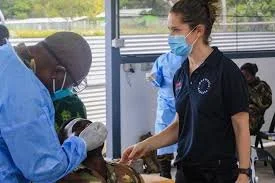An intrepid team of Australian healthcare workers has touched down in Papua New Guinea, where they are working in the field to help stay on top of the global coronavirus crisis.
Papua New Guinea has so far recorded just 11 confirmed cases and zero deaths, but the country is not without its challenges as it works to stop the infection spreading.
Epidemiologist Chiedza Machingaidze, who is advising the country's COVID-19 contact tracing team, has been itching to get stuck in while keeping tabs on the situation from Melbourne.
“I work closely with the surveillance team here at the National Command Centre and essentially work with people that do the case investigation,” she told SBS News.
“Then I receive the list of contacts and work with teams that will routinely check in with the contacts while they do their 14-day quarantine period.”
The experienced epidemiologist had been working from home in Melbourne for the past three months, which she found frustrating.
“I watched the outbreak start and peak and I wasn’t out in the field at that time, so it was very hard to sit on my hands,” she said.
“I was very excited (to go to PNG) I love the work, it is what I love to do so I very excited to be getting back out in the field."
PNG only has 11 virus cases so far and zero related deaths. Source: AAP
For Sydneysider Abby Peacock-Smith the decision to go back into the field was a tough one.
“I think when you go to work in crisis areas or challenged environments you really value the stability of home, and you know that home is there, and so whatever happens you can go back,” she said.
“So, I guess to leave Australia when you know it is not so easy to jump on a plane should the need arise, or should you want to be there, that is a little more disconcerting.”
The registered nurse works alongside the local health department in infection control, advising on personal protective equipment and social distancing guidelines.
Ms Peacock-Smith believes the biggest challenge for health care workers is balancing the need for social distancing with culture. Source: World Health Organisation
“What to wear, when to wear it and how to put it on and off safely,” she explained.
“As well as social distancing - but putting that into a healthcare context. How many patients you can care for, how to best care for them, where to care for them.
“The staff here are exceptionally willing to have help, to have guidance, I think COVID-19 in particular has brought lots of fear around the world, so I think people really want the support, they want the help and they are willing to do anything necessary.”
Fear of returning restrictions
The economic effect of lockdown measures has had an especially drastic toll on the country's poor and vulnerable.
Two women sell betel nuts at a roadside stall near Port Moresby. Source: AAP
“The government acted incredibly swiftly and put restrictions in place and I think there is a lot of fear they need to come back again should we start getting larger numbers,” Ms Peacock-Smith said.
“I think that really effects a lot of people because many people in PNG, they earn their income and support families in quite simple measures, trading or small businesses, so when the restrictions were in place the impact of that it really does affect a huge number of people.”
“I think it really goes against what I would see as the bones of Papua New Guinea culture for centuries.
"It is a culture that really prides itself and is really used to have big family gathering, large households and community gatherings and really strong social bonds, so to ask people to suddenly not do those things, it has been very difficult for many people here.
“One of our greatest challenges is trying to potentially say to people stay at home and isolate, that concept is an incredibly challenged one when you are talking to people that live in big households with 12, 14 up to 20 people in them sometimes more.”
Australia aid funding at its lowest levels since the 1970s
Abby Peacock-Smith and Chiedza Machingaidze are deployed by humanitarian response agency RedR Australia, with funding from the Department of Foreign Affairs.
A DFAT spokesperson told SBS News $280 million has been redirected from Australia’s existing international development program to provide an immediate response to COVID-19.
“Australia has delivered around 170,000 essential medical supplies to Pacific island countries, including respirators, surgical masks, thermometers and testing kits," DFAT said in a statement.
Nichole Georgeou from Western Sydney University told SBS News said aid funding should focus on more than just the immediate health response to the crisis.
“The economic decline from a lack of tourism in the Pacific in particular creates some pressures on local economies,” said Dr Georgeou, who is an Associate Professor in Humanitarian and Development Studies.
“Resilience exists in Pacific Islands and there are strong kinship network, but there are limitations to how many people a village can feed, and if people lose jobs in cities and return to villages there will be pressures on food production."
She said the amount of funding in the Australian aid program as a percentage of gross national income is the lowest it has been since 1970s and it is continuing to decline, despite the global pandemic.
“In my view, the COVID-19 ‘pivot’ represents more continuity than change in the priorities of Australia’s aid program.
“What is not clear is whether this approach will help to build local capacity by expanding local socio economic and cultural capital to resist tensions that emerge from unemployment and economic inequalities in society.”

